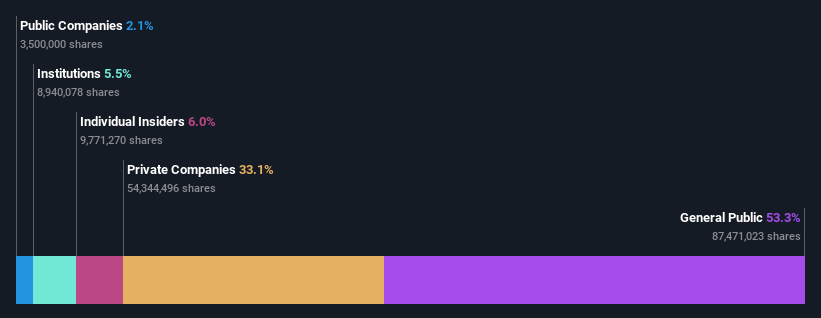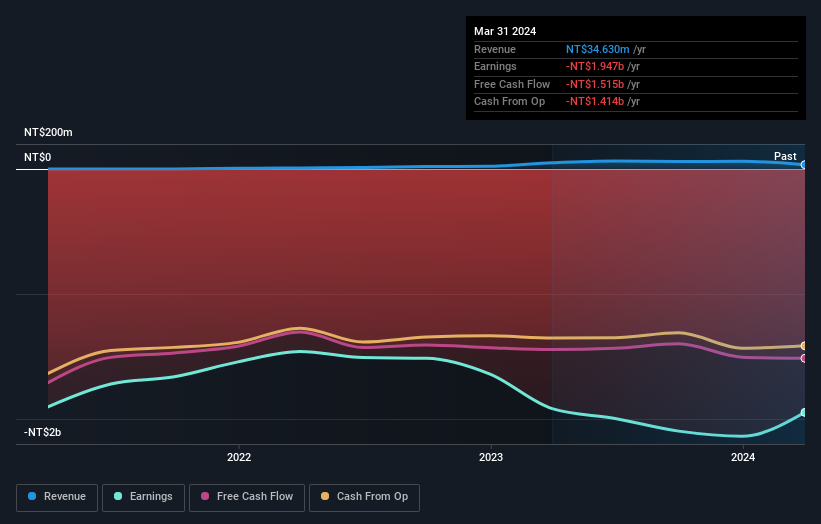Tanvex BioPharma, Inc.'s (TWSE:6541) last week's 15% decline must have disappointed retail investors who have a significant stake
Key Insights
- Tanvex BioPharma's significant retail investors ownership suggests that the key decisions are influenced by shareholders from the larger public
- 47% of the business is held by the top 15 shareholders
- Ownership research, combined with past performance data can help provide a good understanding of opportunities in a stock
If you want to know who really controls Tanvex BioPharma, Inc. (TWSE:6541), then you'll have to look at the makeup of its share registry. The group holding the most number of shares in the company, around 53% to be precise, is retail investors. That is, the group stands to benefit the most if the stock rises (or lose the most if there is a downturn).
And following last week's 15% decline in share price, retail investors suffered the most losses.
Let's take a closer look to see what the different types of shareholders can tell us about Tanvex BioPharma.
See our latest analysis for Tanvex BioPharma

What Does The Institutional Ownership Tell Us About Tanvex BioPharma?
Many institutions measure their performance against an index that approximates the local market. So they usually pay more attention to companies that are included in major indices.
We can see that Tanvex BioPharma does have institutional investors; and they hold a good portion of the company's stock. This can indicate that the company has a certain degree of credibility in the investment community. However, it is best to be wary of relying on the supposed validation that comes with institutional investors. They too, get it wrong sometimes. When multiple institutions own a stock, there's always a risk that they are in a 'crowded trade'. When such a trade goes wrong, multiple parties may compete to sell stock fast. This risk is higher in a company without a history of growth. You can see Tanvex BioPharma's historic earnings and revenue below, but keep in mind there's always more to the story.

Hedge funds don't have many shares in Tanvex BioPharma. Penglin Investment Co., Ltd. is currently the company's largest shareholder with 14% of shares outstanding. Tanvex Biologics, Inc. is the second largest shareholder owning 7.7% of common stock, and Allen Y. Chao holds about 5.3% of the company stock. Allen Y. Chao, who is the third-largest shareholder, also happens to hold the title of Chairman Emeritus.
On studying our ownership data, we found that 15 of the top shareholders collectively own less than 50% of the share register, implying that no single individual has a majority interest.
While it makes sense to study institutional ownership data for a company, it also makes sense to study analyst sentiments to know which way the wind is blowing. As far as we can tell there isn't analyst coverage of the company, so it is probably flying under the radar.
Insider Ownership Of Tanvex BioPharma
The definition of company insiders can be subjective and does vary between jurisdictions. Our data reflects individual insiders, capturing board members at the very least. Company management run the business, but the CEO will answer to the board, even if he or she is a member of it.
I generally consider insider ownership to be a good thing. However, on some occasions it makes it more difficult for other shareholders to hold the board accountable for decisions.
We can see that insiders own shares in Tanvex BioPharma, Inc.. As individuals, the insiders collectively own NT$361m worth of the NT$6.1b company. It is good to see some investment by insiders, but we usually like to see higher insider holdings. It might be worth checking if those insiders have been buying.
General Public Ownership
The general public -- including retail investors -- own 53% of Tanvex BioPharma. With this amount of ownership, retail investors can collectively play a role in decisions that affect shareholder returns, such as dividend policies and the appointment of directors. They can also exercise the power to vote on acquisitions or mergers that may not improve profitability.
Private Company Ownership
It seems that Private Companies own 33%, of the Tanvex BioPharma stock. Private companies may be related parties. Sometimes insiders have an interest in a public company through a holding in a private company, rather than in their own capacity as an individual. While it's hard to draw any broad stroke conclusions, it is worth noting as an area for further research.
Next Steps:
It's always worth thinking about the different groups who own shares in a company. But to understand Tanvex BioPharma better, we need to consider many other factors. Consider for instance, the ever-present spectre of investment risk. We've identified 2 warning signs with Tanvex BioPharma , and understanding them should be part of your investment process.
Of course, you might find a fantastic investment by looking elsewhere. So take a peek at this free list of interesting companies.
NB: Figures in this article are calculated using data from the last twelve months, which refer to the 12-month period ending on the last date of the month the financial statement is dated. This may not be consistent with full year annual report figures.
Valuation is complex, but we're here to simplify it.
Discover if Tanvex BioPharma might be undervalued or overvalued with our detailed analysis, featuring fair value estimates, potential risks, dividends, insider trades, and its financial condition.
Access Free AnalysisHave feedback on this article? Concerned about the content? Get in touch with us directly. Alternatively, email editorial-team (at) simplywallst.com.
This article by Simply Wall St is general in nature. We provide commentary based on historical data and analyst forecasts only using an unbiased methodology and our articles are not intended to be financial advice. It does not constitute a recommendation to buy or sell any stock, and does not take account of your objectives, or your financial situation. We aim to bring you long-term focused analysis driven by fundamental data. Note that our analysis may not factor in the latest price-sensitive company announcements or qualitative material. Simply Wall St has no position in any stocks mentioned.
About TWSE:6541
Tanvex BioPharma
A biopharmaceutical company, researches, develops, manufactures, and sells biosimilar products in Taiwan and the United States.
Mediocre balance sheet with low risk.
Market Insights
Community Narratives




